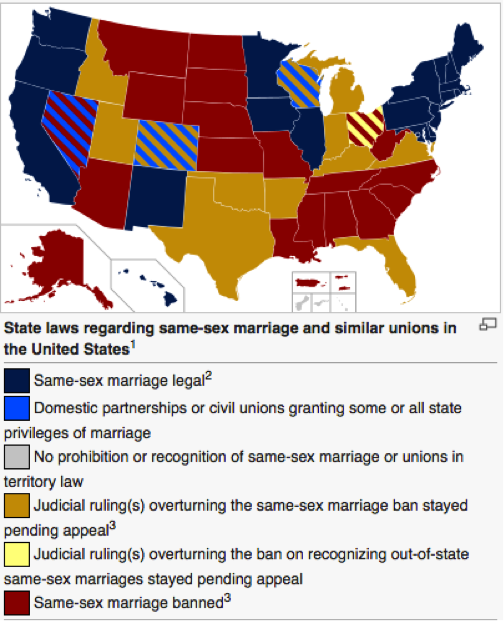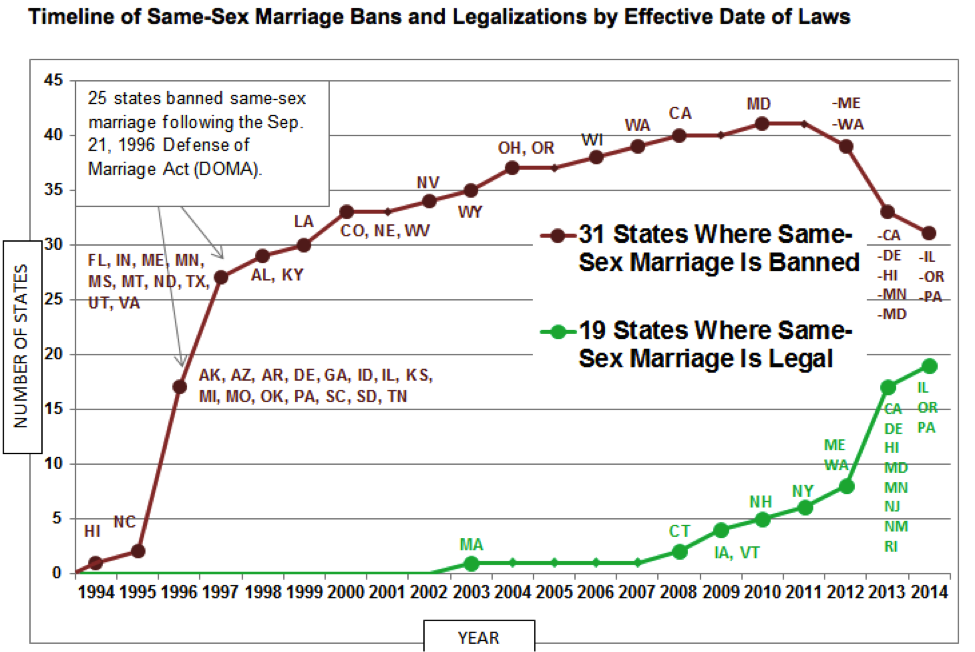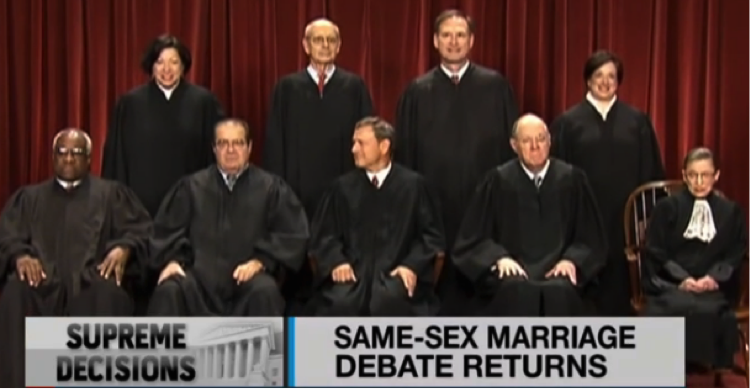Same Sex Marriage – SCOTUS Watch is On
September 30, 2014
U.S. Supreme Court Justices began private meetings yesterday, September 29, 2014, and the Justices could decide whether to take up the issue of same sex marriage rulings from 4 federal appellate court decisions. Currently, 36 states have laws allowing or prohibiting same sex marriage. Same sex marriages are allowed in 19 states and the District of Columbia. Judges in 14 states have struck down prohibitions to same sex marriage.

Five states (UT, OK, VA, IN, WI) filed Petitions for a Writ of Certiorari requesting the Supreme Court to review federal circuit decisions affirming district court decisions finding same sex marriage prohibitions unconstitutional. In addition to the states, 30 corporations, including Alcoa, Amazon, eBay, General Electric, Intel, NIKE, Pfizer, and Target, have filed requests that the Supreme Court should address same sex marriage laws and recognize same sex marriages nationwide.

Some of the recent decisions that SCOTUS could review, include:
- Fourth Circuit – Bostic v. Schaefer, Nos. 14-1167, -1169, & -1173, 2014 U.S. App. LEXIS 14298 (4th Cir. 2014), aff’m Bostic v. Rainey, 970 F. Supp. 2d 456 (E.D. Va. 2014) (affirming grant of summary judgment to plaintiffs and enjoining enforcement of Virginia Marriage Laws at issue). [Petition for Writ of Certiorari filed Aug. 22, 2014]
- Seventh Circuit – Baskin v. Bogan, Nos. 14-2386 & -2526, 2014 U.S. App. LEXIS 17294 (7th Cir. 2014) (affirming district courts in Wisconsin and Indiana which determined prohibitions on same sex marriages were unconstitutional). [Petition for Writ of Certiorari filed Sept. 9, 2014]
- Tenth Circuit – Kitchen v. Herbert, 755 F.3d 1193 (10th Cir. 2014), aff’m Kitchen v. Herbert, 961 F. Supp. 2d 1181 (D. Utah 2013) (holding that Utah Code Ann. §§ 30-1-2, 30-1-4.1, and Utah Const. art. I, § 29 which defined marriage as between a man and woman and prohibited same sex marriage were unconstitutional). [Petition for Writ of Certiorari filed Aug. 5, 2014]
- Tenth Circuit – Bishop v. Smith, No. 14-5003 & 14-5006, 2014 U.S. App. LEXIS 13733 (10th Cir. 2014), aff’m Bishop v. United States ex rel. Holder, 962 F. Supp. 2d 1252 (N.D. Okla. 2014) (holding same sex couples had standing to attack constitutionality of Okla. Const. art. 2, § 35 prohibition of same sex marriage). [Petition for Writ of Certiorari filed Aug. 6, 2014]
Recently, a Louisiana district court judge bucked the current trend of finding same sex legislation unconstitutional. This decision is Robicheaux v. Caldwell, No. 13-5090, 2014 U.S. Dist. LEXIS 122528 (D. La. 2014) (granting defendants’ motion for summary judgment and holding that Louisiana, under a rational basis standard of review, has a legitimate interest in defining the meaning of marriage through democratic process). This decision echoes the sentiment of the dissenting opinion in the Kitchens v. Herbert decision.
 Timeline Banning & Legalizing Same Sex Marriage
Timeline Banning & Legalizing Same Sex Marriage
The watch is now on; we shall see how SCOTUS decides to address or duck the issue.
 U.S. Supreme Court Justices Back row (left to right): Sonia Sotomayor, Stephen G. Breyer,Samuel A. Alito, and Elena Kagan. Front row (left to right):Clarence Thomas, Antonin Scalia, Chief Justice John G. Roberts, Anthony Kennedy, and Ruth Bader Ginsburg
U.S. Supreme Court Justices Back row (left to right): Sonia Sotomayor, Stephen G. Breyer,Samuel A. Alito, and Elena Kagan. Front row (left to right):Clarence Thomas, Antonin Scalia, Chief Justice John G. Roberts, Anthony Kennedy, and Ruth Bader Ginsburg





